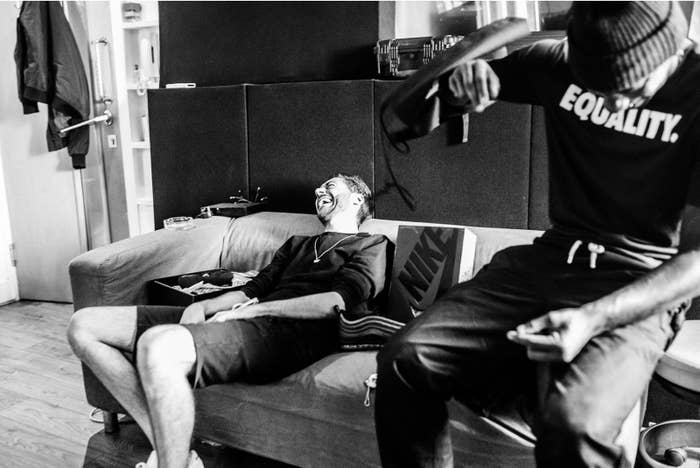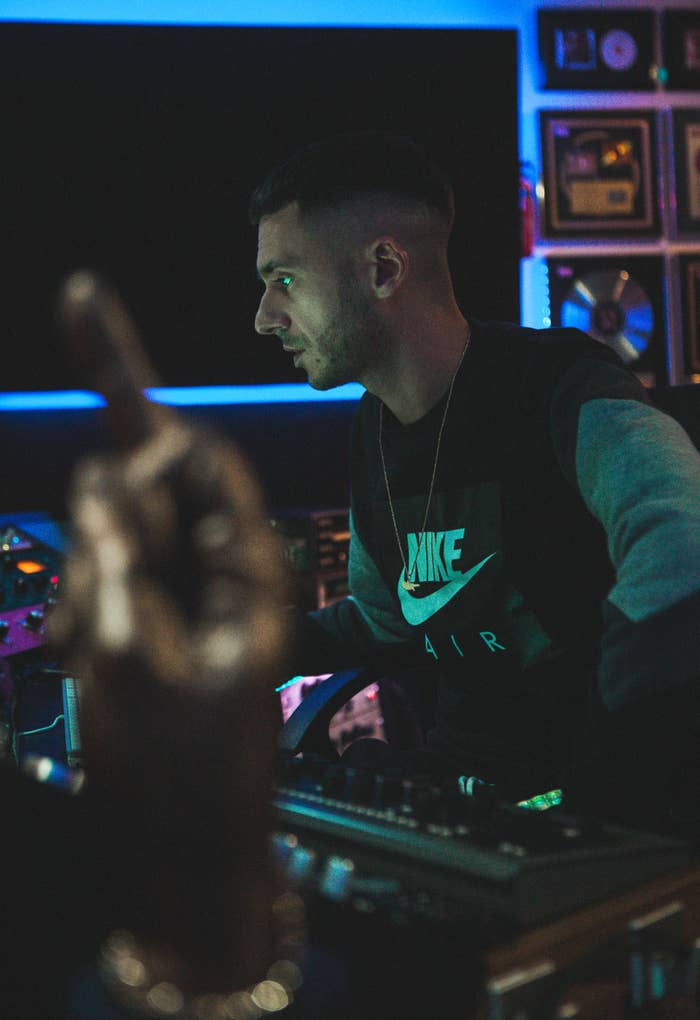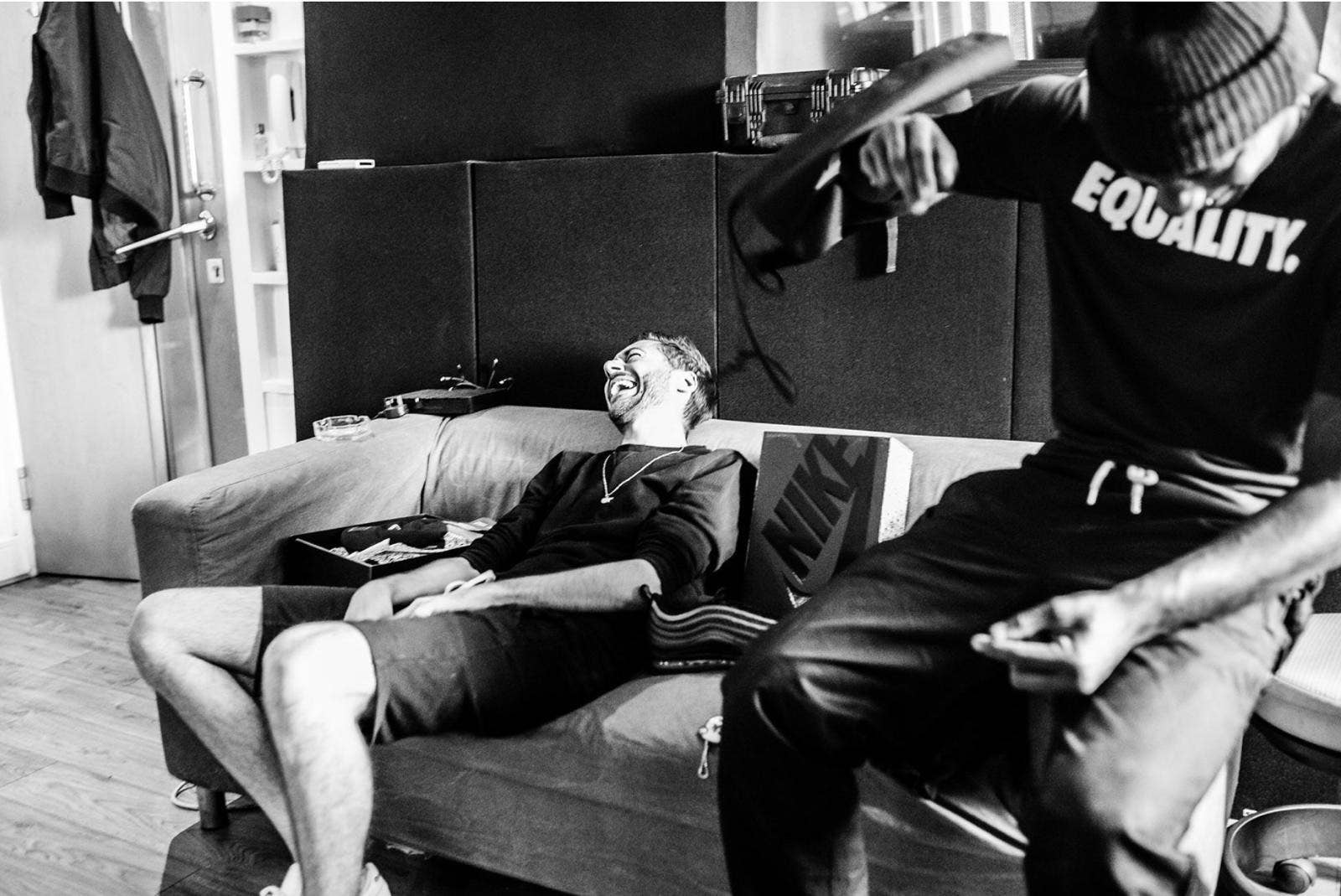
MsM. Yes, you’ve heard the name mentioned on songs, and shouted-out in your favourite grime sets. Born and raised in North London, MsM—real name Michalis Michael—has been working behind the scenes of grime for years as a mixing engineer.
Starting out in his parents’ house in the early 2000s, MsM now boasts an illustrious career, working with the likes of Boy Better Know, Drake, Ed Sheeran, Wretch 32, and more. Top 10-charting albums and singles may compose most of MsM’s resume, but he values his relationship with artists more than any of that. And having just finished working on both slowthai’s Nothing Great About Britain and Skepta’s Ignorance Is Bliss, he tells me the workload from here is only going to become greater, but it’s something that he welcomes.
Taking a break from studio work and PA edits to speak with me over the phone, Michael details the struggles of a fluid and spontaneous timetable—but that greatness can indeed come from it, too. MsM offers a unique perspective from behind the recording glass, and speaks with all the authority of experience.
COMPLEX: We’ve heard the name ‘MsM’ bigged up on grime sets and songs by Skepta for what seems like forever, so it’s good to be talking to the man himself. How would you describe your role—what does it entail?
MsM: I’m a mixer/engineer, so around 90% of the time I’m mixing for people. For Skep, though, my role is very different to a lot of the other stuff I do. For example, some people don’t even meet me, they’ve just heard the name, so they want a certain sound or they like a certain song that I’ve done. They’re like, “I want him to mix my song.” That goes through management—the songs hit me, I do the songs, I send them back. We might jump on the phone backwards and forwards—that can be one day. Another day, like with Skep, we would make something from scratch. It’s a moving role; the goalposts are always moving. As much as I say I love things being structured, that’s not always the case. I’ve learned that to make progress in music, you can’t enforce that structure—you just have to let go and make music, however you can, wherever you can.
What makes you unique to other engineers in the game?
That’s an easy one: I grew up with people making music. We were learning how to make it as friends, so every time we did a song, we discovered something new. I’ve been involved in Boy Better Know before it was Boy Better Know, just as mates making cassettes and tapes and stuff, so when you’re doing that, you get to understand artists on a level that I don’t think you’d get if you went to a recording school or a university to learn it. I had to work before I knew what I was doing. Just because we were kids, bored, we didn’t really want to carry on doing dumb shit out on the streets—let’s just make music. Okay, how do we do this, M? Well, my dad had a mic. I stole a car and there was a mixer in the boot; I gave my friend the car, kept the mixer—but what do we do with it? And we’re all kind of figuring it out. So, if we connect this, turn this up—shit, that sounds sick now! It was a discovery on the job. My advantage is that I’ve just grown up with musicians and I’ve learned how to do this, and I came up in the era where I was before the internet and after it. I was before grime and after that too. So this all feels like I’ve never had a job. I’m doing the same thing I’ve been doing since I was 14, nothing’s changed, but I just make sure I’m always learning.

Your name seems to ring off within the grime scene the most. What would you say to the grime doubters out there right now?
It’s just like punk was, like hip-hop was in the early days: it’s street music from people that want to make music, and that was their way of doing it. They taught themselves. I don’t care about people who comment on that stuff, I don’t. I think that there’s always gonna be someone with something to say. I’ve made my whole life off of this so should I not have all these things? Should I not be doing well because of your opinion? Nah, I’m alright. Every time I see something like that, I remember all the times we were going and doing uni raves and there were kids so happy to see my friends perform. You can’t argue that. You can’t take that away from anyone. I used to see that and think, “This will go one day.” And look: it’s happened! It’s now at a place where more of my American friends are listening to this more than anything; they’re catching on. I’m going through this whole process again where I’m explaining to them the past fifteen years. They’re discovering things that I’ve watched ten years ago; my friends are watching the old DVDs now, YouTubing them to do their research and play catch-up. It’s sick. To me, there’s no good and bad in art.
“I think Skep just likes people that are dedicated to what they wanna do.”
You’re from North London, where Skepta and most of Boy Better Know are from. Tell me how you connected with Skepta in the early days of his career.
I lived near him and he was Jamie’s (Jme) older brother. Me and Jamie used to knock about in my area; it was just a mutual friends thing at first, and everyone sort of knew that I was trying to do music, making beats at home, DJing, etc. I think I met Jamie like 2002/2003—I was in school, I know that much. Then me and Jamie got on straight away, we were always around each other. And then through that, I got to know Skep; this was when he was the DJ for Meridian Crew. Them days, I didn’t really roll with Skep because of the age difference. When you’re like 14/15 and Skep was like 18/19, that’s a big age gap at that point in your life. So he was just the cool older brother, but I used to listen to what he was doing and I was like, “Nah, this guy is fucked! He’s so sick!” Slowly but surely, he came to my house to record and then by about 2005/2006, we just started making music. We just got on. It just clicked! I think Skep just likes people that are dedicated to what they wanna do. So, it’s like: Maximum’s the DJ and he wants to do that to the best of his ability, MsM’s the engineer and he wants to engineer to the best of his ability, so we just filled in the blanks and it’s been non-stop ever since.
From your perspective, how would you say Skepta’s approach to music has changed over the years?
If anything, it’s gone back to how it was. Even on this album [Ignorance Is Bliss], we went back to the mentality of there not being anyone in the room. I don’t think anyone heard the album apart from me and him until the launch party. Maybe [his manager] Sam heard it that week, but he didn’t hear it until we’d finished it—nobody heard anything. That’s what it used to be like when we were making songs at my house, because it was my mum’s house. You couldn’t really have 10, 15 guys in the room. It was a small bedroom. It would be me and Skep, and maybe one other person. We went back to that for this album; we went back to old programs we were making music on, we were listening to old things together and this is because we’ve gone around the block once, twice, three times. We’ve always constantly refined things but, generally, we know each other well in the studio so it just works. I always tried to work around him and figure it out as we go.
So, with Ignorance Is Bliss, what was the main thing that you guys wanted to achieve going into the album?
We’ve tried to make music many different ways. It just boiled back down to what we used to do, in a much more refined way. We always had it, so it was like: “You know that thing you used to do with the bassline there, we should do that here.” For that reason, it’s one of the best albums I’ve been involved in making. A lot of people have said they’ve loved listening to it—they’ve said that they can hear our relationship coming through on it. It went full circle: the producing side of it was able to bring back the old sound that we used to have. There was a period, a few years back, where I was assisting and never had a studio of my own. So this album, for me, was like: “OK, you’ve gone and mastered your craft—I’ve gone and mastered mine—so we need to come back together and do something together again.” And it was that; the 2.0, you could say, of the friendship and the working relationship. Everything we’ve learned in the last 15 years—refined. But this is without trying to ‘pop’ it up, we’re not trying to over-polish it, we’re just trying to make the sickest music, make what we think are the sickest tunes. When we’re at the end of the album, are you happy? Down to the last hurdle, it was like, “Skep. If you’re not happy, I’ll change it right now. The deadline’s tomorrow, but I don’t care, it’s until you are happy.” That’s what I’ve learned through it. Before, we’d always put stuff out and think we could have done this or that better, but we didn’t do that this time.
I’m just glad everyone likes it; and they’re hearing the right things as well. I’ve had times where I’ve put music out and people are like, “This is so sick! Yeah, this is amazing.” But I’m like, “You’re my friend, you’re meant to say that.” Someone said to me the other day that in their group chat, they’re discussing their favourite songs. Usually, they just pick their favourite songs, listen to them and move on. On this particular album, they’re in the chat giving particular reasons as to why Skep said that on this or that track; they’re digesting it and breaking it down differently. I think a lot of that has to do with Skepta having more life experience. Not many people have gone through what he’s gone through in the last four years. You don’t even get to go through that twice! That catapult from a guy who’s been working in music for so long, and has so many opinions and feelings about it, to then boom: worldwide, everyone knows your name. Now, what do you feel? He literally says he’s been around the world now—he’s been everywhere. Of course, this album’s gonna have a bit more to say, but I’m just glad we got it out the right way. There’s nothing at the end of it where we feel like we could’ve this or that better.
You also worked on Nothing Great About Britain—incredible album! How was it working with slowthai on that?
Fucking brilliant. That kid is special! I met him in the car park to my studio, by accident. I already knew who he was from online, I knew Skepta bucked him, and a few people told me that he was a good kid. I was actually in a session with Skep, I went outside and slowthai is just standing there smiling in a random car park, and I was like: “Bro, I know who you are but you don’t know who I am.” He shook my hand, grinning, and I’m thinking, “Why are you even shaking my hand? I’m a stranger; I could be anybody.” I then told him to roll upstairs; Skep was there, we went into the room, made him a bloody green tea, and that was it—he joined the session. From there, we just got on. I knew his producer, Kwes Darko, for a while and he’d been telling me about slowthai for ages. It just reminded me of like 2003/2004, when you hear somebody whose emotions come through more than their pronunciation. His emotion will take over the verse and you’ll sit there thinking, “What did he just say?” There’s so much passion in what he does, and I love that. Sometimes, MCs will be doing a take and they’ll say, “Ah, let me do it again. I shouted a bit.” But I like that; it’s all part of the emotion. slowthai just does it—it’s like he’s still on pirate radio mentality, he’s still in that early era.
Even now when everybody is so concerned with what everybody thinks and when you can polish a song within an inch of its life, he’s got this anarchy about the way he makes music. I just love it. I think it’s sick. I hope we look back in 5 years and see it like that—even more than that. When we first started mixing it I knew it was gonna be something because I was listening to it every day on the way home, and that’s always a sign for me. Usually, I’ll get in the car, listen to what I’ve just worked on, and then I’ll go back to whatever I’m listening to, to get my mind out of work. But, if I notice that it’s been three or four days now and nothing but my work has been on in the car, that means that you can’t get enough of it. That means something’s there. I’m still listening to this album now! Just because it’s done, doesn’t mean that it’s over. Right now, we’re in an era where albums and songs last—what, two weeks? I don’t feel like this is one of them.
It seems like forming a strong connection with the people you work with is highly important to you.
Music is a personal thing for the people who make it. That level of trust and understanding seems to be what gets me through it all. I’ve listened to my friends’ opinions on engineering as a whole, their feedback from studio sessions and what they expect from me and anyone doing my job. That’s invaluable. It’s honest, too. Not some polite default email. I realised it’s about being talented, of course, but after that, it’s about working on developing your skills as a listener and translator for the musician’s and artist’s ideas. For me to take a song they already love and try to make it better, there has to be some trust. I’m wearing many hats at the minute, mixing for a lot of different types of artists. Maybe because they’re not shouting my name in interviews, you wouldn’t know it, but I’m doing pop stuff, R&B stuff, whatever you want to call it, and it’s working because I’m communicating with the artists and producers. They trust me because of what I’ve already done and they know I’m not just saying, “Gimme the files, I’ll do my thing, and if you don’t like it—fuck off.” That doesn’t work. You end up having an artist running around saying “he’s shit because…”, whereas I’d rather have an artist run around and say “nah, M’s the best”, because I actually give a shit. That, to me, has been my USP: the connection. Fuck the equipment!
“Be there from the ground-up with new artists, and believe in the people around you.”
What are the most important things you’ve learned from your time in the music industry?
The artists’ feelings about their music is probably more important than anything. That can apply to me keeping clients, though. I’m not gonna say that’s the most important thing in music—I’m just saying that, for me to keep my regular clients, you have to understand that everyone is different. Someone sent me a voice note the other day saying, “Yo, it’s so interesting how slowthai’s album sounds like this and Skepta’s album sounds like that, but they’re both sick.” You can’t give a better compliment. I don’t want you to hear that I’ve done it—that’s what I’ve learned. I want to be the artists’ best friend, but to the fans, they can’t tell. As long as I can constantly focus on being that person, I’m golden. And what I do is tailor-made, rather than you come to me and there’s this set MsM thing. I want it to sound good, but I don’t want it to be that you can tell every time it’s me behind the boards. I don’t know... Maybe the quality, where you can tell that it’s an ‘M thing’, but I don’t want slowthai to sound like Skepta is what I’m saying. I don’t want CASisDEAD to sound like Skepta. They’ve all got their own aesthetics and own ideas. All of these people are discussing with me how they want it to sound.
Any advice for aspiring producers/sound engineers?
Be prepared for long hours and hard work. This hasn’t been easy. Form good relationships and be there from the ground-up with new artists, and believe in the people around you. There was a period where music in England wasn’t really going too well and everyone started feeling doubtful, and it was all just a bit dark and gloomy. Really, the truth was it was under my nose all along—it just needed a bit more time. When I was looking elsewhere for stuff, like American work, it was really right there the whole time—it was one of my best friends, the people around me. We just had to wait for the world to get it.
What can we expect in the near future from you? Are there any artists that you’re looking to work with?
I’m doing so much stuff, but in typical fashion, I can’t really say too much because I don’t know who’s announced what. I don’t know who wants people to know. I’m just on working with anyone who cares about their music and doesn’t just care about the views and numbers. You lot can go elsewhere. When people wanna give a shit about what they’re doing and wanna have a conversation, then I am all in. I’m busy, man—I wish there were two of me! I wish there was a clone, bro [laughs]. Just for a couple days! It’s crazy. I’m doing seven days a week! I probably get here like 12 noon, and leave at around 3am—every day, without fail, and I live a good hour away. I keep telling my manager we’re at full capacity right now, I can’t do any more. What’s coming up, though? Loads, man. Loads.

